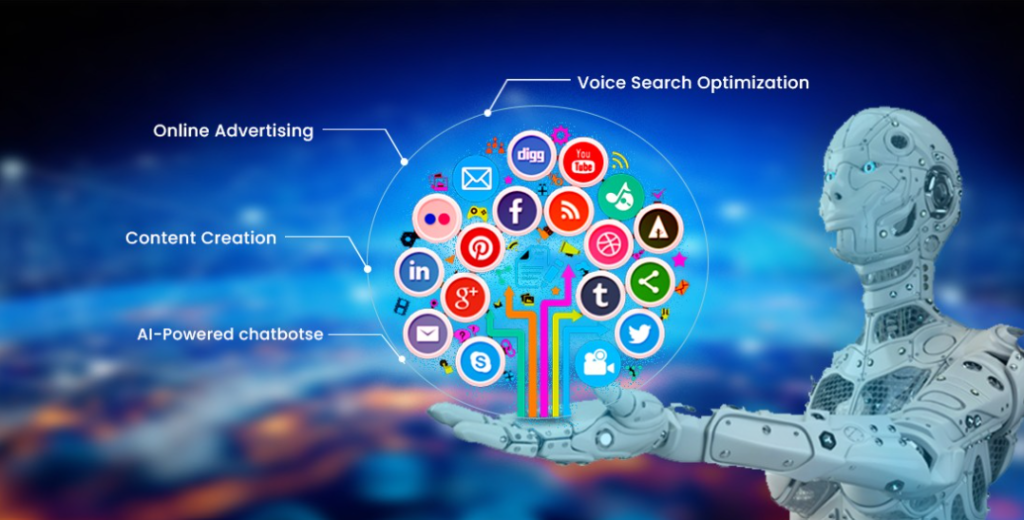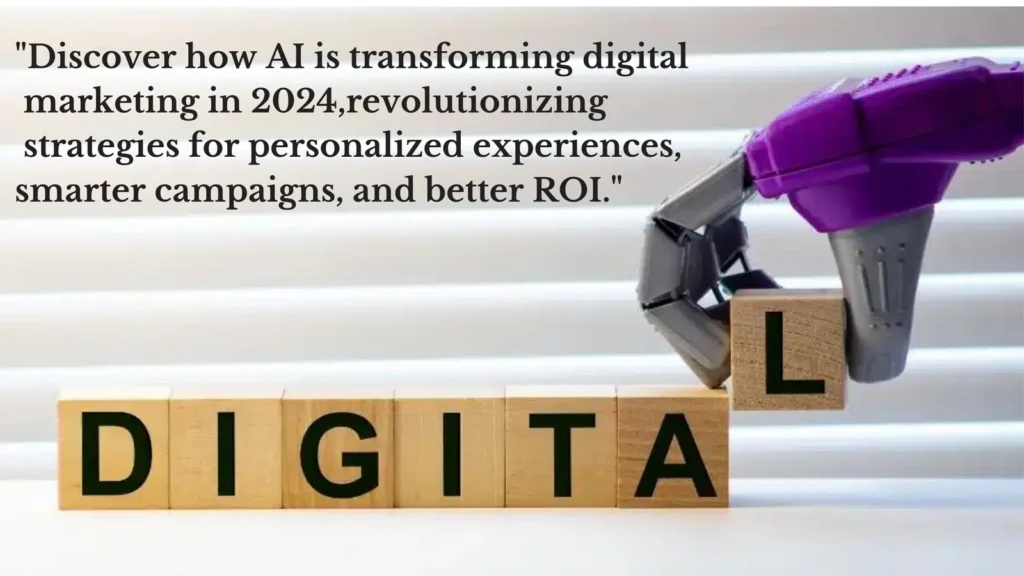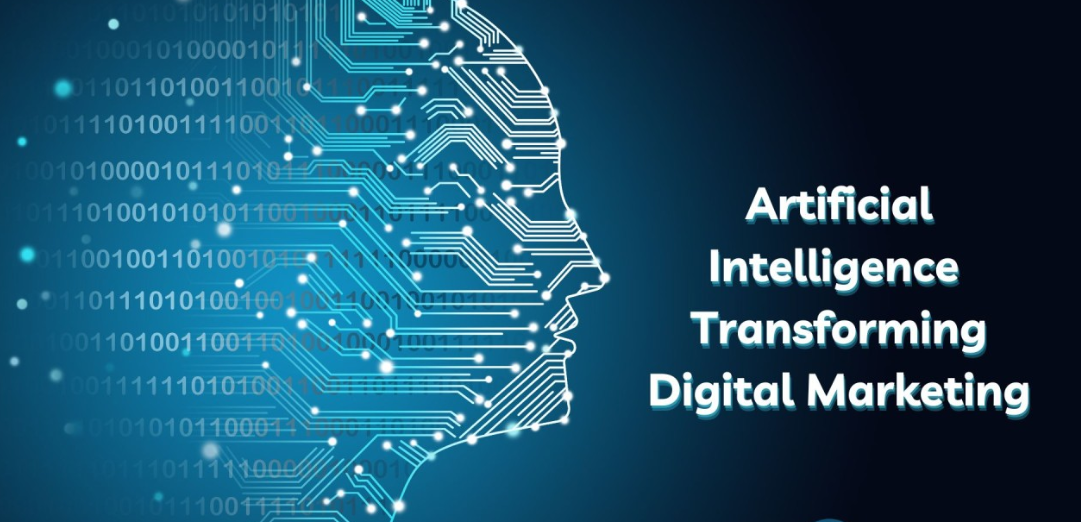In recent years, artificial intelligence (AI) has transformed numerous industries, and digital marketing is no exception. With the rise of machine learning, predictive analytics, and automation, AI is enabling marketers to operate more efficiently and deliver hyper-personalized experiences. In 2025, AI will play an even more significant role in shaping the future of digital marketing. From content creation to ad targeting, AI offers new ways for businesses to stay competitive in an increasingly crowded digital landscape.
As technology evolves, leveraging AI-powered strategies is no longer optional—it’s essential for success. In this blog, we’ll explore how AI is revolutionizing digital marketing in 2025, the key trends to watch for, and how businesses can harness the power of AI to boost customer engagement and optimize campaigns.
Artificial Intelligence (AI) has become a transformative force in digital marketing, revolutionizing the way businesses connect with consumers and drive growth. Once considered a futuristic technology, AI is now a cornerstone of marketing strategies. In 2025, its impact is profound, with advanced AI tools empowering marketers to deliver hyper-personalized experiences, optimize campaigns with data-driven insights, and streamline operations for maximum efficiency.
This article delves into how AI is reshaping the digital marketing landscape in 2025, uncovering key trends, challenges, and strategies for success. Whether you are a seasoned marketer or a business exploring AI integration, this guide provides actionable insights to harness the power of AI and achieve sustainable growth.

The Role of AI in Digital Marketing
Personalization at Scale
AI-powered algorithms process vast datasets to create hyper-personalized experiences. By analyzing user behavior, demographics, and preferences, brands can tailor their marketing efforts to individual customers. Key applications include:
- Email Campaigns: Dynamic content personalization based on user actions.
- Product Recommendations: E-commerce platforms suggest relevant products.
- Landing Pages: Customizing content for specific audience segments.
These techniques ensure higher engagement rates and customer satisfaction.
Enhanced Customer Insights
AI tools provide marketers with actionable insights into customer behavior. By leveraging predictive analytics, businesses can:
- Forecast customer lifetime value (CLV).
- Identify customers at risk of churn.
- Understand purchasing patterns and preferences.
These insights help marketers create strategies that resonate with their target audience.
AI in Advertising
AI transforms advertising by optimizing campaigns in real-time. Applications include:
- Real-Time Bidding: Automating ad placements for maximum ROI.
- Dynamic Ad Creatives: Adjusting content to suit user preferences.
- A/B Testing Automation: Continuously improving campaign performance.
Platforms like Google Ads and Facebook Ads Manager utilize AI to enhance targeting precision and reduce ad spend waste.
Key Trends in AI and Digital Marketing
AI-Powered Content Creation
Creating compelling content is easier than ever with AI. Tools like ChatGPT, Jasper AI, and Writesonic assist marketers in generating:
- Blog posts and long-form articles.
- Social media captions and ad copy.
- Video scripts and promotional content.
For instance, Writesonic enables businesses to produce high-quality, SEO-optimized content in minutes.

AI Agents and Chatbots
AI-powered chatbots and virtual assistants are revolutionizing customer service by:
- Providing 24/7 support.
- Handling routine queries efficiently.
- Upselling and cross-selling products during interactions.
These tools improve customer satisfaction while reducing operational costs.
Generative AI in Visual Content
Generative AI tools help marketers design visually appealing content, such as:
- Infographics: Data-driven visual storytelling.
- Social Media Videos: Engaging, shareable content.
- Customized Banners: Personalized visuals for targeted campaigns.
This automation saves time and ensures high-quality output.
AI’s Impact on Key Digital Marketing Channels
Search Engine Optimization (SEO)
AI enhances SEO strategies through:
- Generative Engine Optimization (GEO): Optimizing for conversational and intent-based searches.
- Voice Search: Adapting content for smart assistants like Alexa and Siri.
- Content Audits: Tools like SurferSEO ensure alignment with search intent and keyword strategies.
Marketers can achieve better visibility and higher organic traffic by integrating AI-driven tools.
Social Media Marketing
AI revolutionizes social media strategies by:
- Content Prioritization: Platforms like Instagram and TikTok use AI to surface engaging content.
- Sentiment Analysis: Tools like Socialbakers help analyze audience sentiment and refine messaging.
- Trend Analysis: Identifying emerging trends for timely campaigns.
These advancements ensure brands stay relevant and impactful on social platforms.
Email Marketing
AI elevates email marketing with features like:
- Hyper-Segmentation: Creating tailored email lists.
- Subject Line Optimization: Crafting compelling headlines.
- Send-Time Optimization: Delivering emails when users are most likely to engage.
Such tools enhance open rates and drive conversions.
Why AI is Crucial in 2025
- Consumer Expectations: Modern consumers demand tailored experiences and instant gratification, which AI facilitates through data analysis and automation.
- Efficiency and Scalability: AI allows marketers to manage campaigns at scale while reducing costs and manual effort.
- Competitive Edge: Brands that adopt AI can outperform competitors by staying ahead of trends and delivering superior customer experiences.

Challenges of AI in Digital Marketing
AI Fatigue
While AI offers incredible capabilities, over-reliance can result in generic or impersonal experiences. Balancing automation with human creativity ensures campaigns remain authentic and engaging.
Ethical Concerns
AI raises issues around data privacy and algorithmic bias. Businesses must prioritize:
- Transparent data usage policies.
- Ensuring fairness in AI-driven decisions.
Cost and Accessibility
High-quality AI solutions can be expensive, posing challenges for small businesses. Scalable, open-source tools and SaaS solutions help bridge this gap.
Future Outlook: AI and Beyond
AI will continue to shape the future of digital marketing by integrating with emerging technologies such as:
- Augmented Reality (AR): Offering immersive brand experiences.
- Virtual Reality (VR): Enhancing product visualization and engagement.
Forward-thinking companies like Disruptive Advertising are already harnessing AI to deliver breakthrough results. By embracing these advancements, businesses can stay ahead of the curve.
Strategies for Success in AI-Driven Digital Marketing
- Continuous Learning and Adaptation: Stay updated on AI advancements and trends to maintain a competitive edge.
- Invest in AI Tools and Platforms: Evaluate and adopt AI solutions tailored to your marketing goals, such as content creation platforms, predictive analytics software, and automation tools.
- Focus on Data Quality: High-quality data is critical for AI accuracy. Invest in data management systems to ensure consistency and reliability.
- Enhance Personalization Efforts: Use AI to create customized experiences, from dynamic website content to personalized product recommendations.
- Optimize for AI-Powered Search Engines: Update SEO strategies to include voice search optimization and AI-driven search algorithms.
- Develop a Robust ethics policy: Implement transparent AI practices, respect consumer data privacy, and foster trust.
AI is Transforming Digital Marketing FAQ
How is AI enhancing customer experience in digital marketing?
AI enables personalized customer experiences through advanced analytics, real-time data processing, and predictive modeling. By leveraging AI-driven tools like chatbots, recommendation engines, and sentiment analysis, businesses can offer tailored content and services that align with individual preferences, improving customer engagement and satisfaction.
What are the key ways AI is transforming digital marketing in 2025?
AI is revolutionizing digital marketing through advanced personalization, predictive analytics, automated content creation, chatbots for customer engagement, and real-time ad targeting.
What are the latest AI-driven marketing trends in 2025?
Key trends include voice search optimization, AI-powered video content generation, hyper-personalized email campaigns, AR/VR experiences driven by AI, and predictive customer journey mapping.
What are the benefits of using AI in digital marketing campaigns?
AI improves efficiency, enhances customer experiences through personalized content, increases ROI by optimizing ad targeting, and provides actionable insights with real-time data analysis.
Are there any challenges or risks associated with implementing AI in digital marketing?
Challenges include data privacy concerns, high initial investment costs, the need for skilled professionals to manage AI tools, and potential over-reliance on automated systems leading to less human oversight.

AI in Digital Marketing Conclusion:
AI is redefining digital marketing in 2025, enabling businesses to operate more efficiently and connect with their audiences on a deeper level. From personalized experiences to advanced analytics, AI empowers marketers to create innovative, effective campaigns. Staying informed and adopting AI-driven tools and strategies is crucial for businesses aiming to thrive in this competitive era. Now is the time to integrate AI into your digital marketing strategy and unlock unprecedented growth opportunities.
AI has revolutionized digital marketing by enabling hyper-personalized experiences, automating tasks, and providing predictive insights. In 2025:
- 90% of marketers utilize AI for customer interactions.
- Campaign costs have reduced by 30%, with an average ROI increase of 20%-40%.
- Over 70% of businesses employ AI-driven automation for efficiency.
Emerging trends, such as AI-driven metaverse advertising and dynamic content generation, are set to redefine marketing further. The global AI in marketing market, projected to reach $107 billion by 2030, underscores AI’s long-term potential.
Call to Action
Marketers must embrace AI innovation to stay competitive. By investing in the right tools, maintaining data integrity, and prioritizing ethical practices, businesses can unlock AI’s full potential and achieve enduring success in the ever-evolving digital marketing landscape.






















































































































































































































































